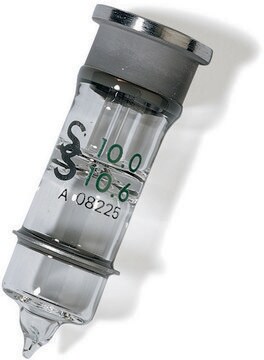220201
CHAPS
Molecular Biology Grade
Synonym(s):
CHAPS, 3-[(3-Cholamidopropyl)dimethylammonio]-1-propanesulfonate
About This Item
Recommended Products
Product Name
CHAPS, Molecular Biology Grade,
grade
Molecular Biology
Quality Level
description
Merck USA index - 14, 2044
zwitterionic
assay
≥98% (NMR)
form
crystalline powder
mol wt
micellar avg mol wt 6150
manufacturer/tradename
Calbiochem®
storage condition
OK to freeze
desiccated (hygroscopic)
aggregation number
10
Looking for similar products? Visit Product Comparison Guide
Related Categories
General description
Application
Useful for solubilizing membrane proteins and breaking protein-protein interactions. CHAPS′ small micellar molecular weight (6,150) and high critical micelle concentration (6-10 mM) allow it to be removed from samples by dialysis. It is also suitable for protein solubilization for isoelectric focusing and two-dimensional electrophoresis. CHAPS is commonly used for non-denaturing (without urea) IEF and has been shown to give excellent resolution of some subcellular preparations and plant proteins. Concentrations between 2-4% (w/v) are typically used in an IEF gel.
Warning
Reconstitution
Other Notes
Ofri, D., et al. 1992. J. Neurochem. 58, 628.
Ransom, R.W., et al. 1992. Biochem. Pharmacol. 43, 1823.
Simonds, W.F., et al. 1992. Proc. Natl. Acad. Sci. USA77, 4623.
Yannariello-Brown, J., and Weigel, P.H. 1992. Biochemistry31, 576.
Hjelmeland, L.M. 1980. Proc. Natl. Acad. Sci. USA77, 6368.
Simonds, W.F., et al. 1980. Proc. Natl. Acad. Sci. USA77, 4623.
Legal Information
signalword
Warning
hcodes
Hazard Classifications
Acute Tox. 4 Oral
Storage Class
11 - Combustible Solids
wgk_germany
WGK 3
flash_point_f
Not applicable
flash_point_c
Not applicable
Certificates of Analysis (COA)
Search for Certificates of Analysis (COA) by entering the products Lot/Batch Number. Lot and Batch Numbers can be found on a product’s label following the words ‘Lot’ or ‘Batch’.
Already Own This Product?
Find documentation for the products that you have recently purchased in the Document Library.
Customers Also Viewed
Our team of scientists has experience in all areas of research including Life Science, Material Science, Chemical Synthesis, Chromatography, Analytical and many others.
Contact Technical Service![CHAPS (3-[(3-Cholamidopropyl)-dimethylammonio]-propane- sulfonate) for biochemistry](/deepweb/assets/sigmaaldrich/product/structures/265/550/452ffcaa-af89-4e31-99a1-0a0f29072b82/640/452ffcaa-af89-4e31-99a1-0a0f29072b82.png)







